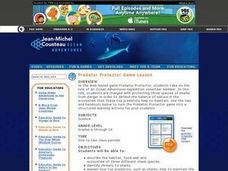Consortium for Ocean Science Exploration and Engagement (COSEE)
Arctic Smorgasbord
Though the walrus spends roughly one third of its time on land, it eats organisms that live on the bottom of the ocean. The first in a series of five, the lesson uses a variety of plant and animal cards to have scholars build an arctic...
Curated OER
Life in the Crystal Palace
Marine biologists research sea ice communities. Assign some groups to construct paper models of sea ice communities in winter, and some to construct models of them in summer. The instructional activity is simplistic, but the Internet...
Curated OER
Climate Change Challenge
Students participate in a demonstration in which they role-play polar bears and habitat components to demonstrate the impacts of climate change on the Arctic Ocean ecosystem.
Curated OER
The Good, The Bad, and the Arctic
Students investigate the social, economic and environmental consequences that might result from Arctic climate change. Students identify and discuss at least three consequences.
Curated OER
Polar Day: Arctic Clean Up
Students explore the concept of pollution. In this environmental stewardship lesson, students examine primary sources to research the complexity of pollution and its effect on the Arctic.
Curated OER
Climate Change
Ninth graders compare the Arctic and Antarctic. In this climate lesson students work in groups, research and complete an oral report or a poster.
Curated OER
A Coastal Arctic Food Web
Students create a food web of the arctic ecosystem. In this biology lesson, students explain how global warming affects this ecosystem. They explain how losing a species affects the entire community.
Curated OER
2005 Hidden Ocean Expedition What's Eating You?
Analyze data and make inferences about the trophic position of organisms in the Canada marine food web. After a review of the geography and formula, discuss results and write an essay to improve the understanding of Artic food webs.
Polar Trec
Bering Sea Fabulous Food Chain Game
In spring, the Bering Sea turns green due to phytoplankton, which live at the surface, experiencing a population explosion. Groups of scholars play a food chain game, writing down food chains as the game is played. After five to six...
NOAA
Exploring Potential Human Impacts
Arctic sea ice reflects 80 percent of sunlight, striking it back into space; with sea ice melting, the world's oceans become warmer, which furthers global warming. These activities explore how humans are impacting ecosystems around the...
NOAA
Community Ecology and Sampling
Seamounts in the Coral and Tasman Seas are home to more than 850 different species. Groups explore hydrothermal vents, researching the organisms found there and their energy source. They also learn about seamounts, exploring their unique...
Curated OER
Predator Protector Game
Students take on the role of an Ocean Adventures expedition volunteer member and are charged with protecting three species of sharks from danger in order to defend the balance of nature in the ecosystem. They play an online game which...
Consortium for Ocean Science Exploration and Engagement (COSEE)
Understanding the Food Web
Building on prior knowledge of the pervious lesson plan in the series, pupils explain the previous lesson plan to each other. Then they write a simple guide for a young child to read on the same topic.
Curated OER
Whale Watcher Game Lesson
Students participate in an online whale watching game. They identify the reasons for migration and describe the route. They make predictions on what would happen if the ways did not migrate.















